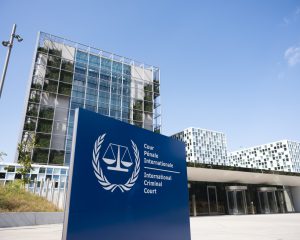The Philippines has “no intention” of rejoining the International Criminal Court (ICC) and allowing it to proceed with an investigation in the country, President Ferdinand Marcos Jr. said yesterday.
The decision was announced after Marcos met last week with the top lawyers and officials of his administration to discuss how to handle the ICC’s investigation into former President Rodrigo Duterte’s violent “war on drugs.”
“The Philippines has no intention of rejoining the ICC,” Marcos Jr. told reporters on Monday. “There is already an investigation here and it’s ongoing. So why would there be a need for (an ICC investigation)?”
Last September, judges at the ICC authorized an investigation into the Philippines’ deadly “war on drugs” campaign, describing it as a “widespread and systematic attack against the civilian population.” The campaign, which began the moment that Duterte was sworn into office in mid-2016, has claimed thousands of lives, by the government’s account; some human rights groups put the death toll as high as 12,000.
Marcos’ announcement came after Karim Khan, the ICC’s chief prosecutor, in June requested the resumption of the court’s investigation into the anti-drug campaign, which has been paused since a deferral request from Manila in November. The Philippines requested the deferral under the principle of complementarity, claiming that it had begun its own investigations into cases of extrajudicial killings attributed to the police during “drug war” operations – and that the ICC’s investigation was therefore unwarranted. Khan said in June that the request by the Philippine government was “not warranted” and that the investigation should restart “as quickly as possible.”
In any event, the Philippines claims that the court has no jurisdiction over the country, following Duterte’s withdrawal from the Rome Statute, the treaty that governs the ICC, in March 2019. But court prosecutors claim that they have jurisdiction over crimes committed prior to that point. Former ICC chief prosecutor Fatou Bensouda said in late 2020 that a preliminary probe had found “a reasonable basis to believe that the crime against humanity of murder has been committed on the territory of the Philippines” between July 1, 2016, when Duterte came to office, and the country’s withdrawal from the Rome Statute on March 16, 2019.
In its announcement last September, the ICC also included in the scope of the investigation killings in the area of Davao on the southern island of Mindanao dating back to November 1, 2011, the date that the Philippines acceded to the Rome Statute, to June 30, 2016. This was a period when Duterte was mayor of Davao City, and road-tested the violent law-and-order populism that he would later expand nationwide.
Whatever the legal merits of the ICC’s argument, it will be virtually impossible for an investigation to proceed in the face of concerted opposition from the Philippine government. The Duterte administration said that ICC investigators would be barred from entering the country, and it’s hard to see them being granted access under Marcos – especially given that the investigation concerns a political ally (whatever Duterte’s personal misgivings about Marcos).
It was always unlikely that a figure like Marcos, the son of the dictator Ferdinand E. Marcos and the likely beneficiary of his family’s world-beating pilfering of the national accounts, would embrace the organs of international criminal justice. But the roadblock demonstrates the challenges that the ICC has always faced in breaching the ramparts of national sovereignty, especially of nations with the willingness and capacity to resist it.
It is yet another reminder that a lot has to go right for the target of an ICC investigation to end up on trial in The Hague.

































